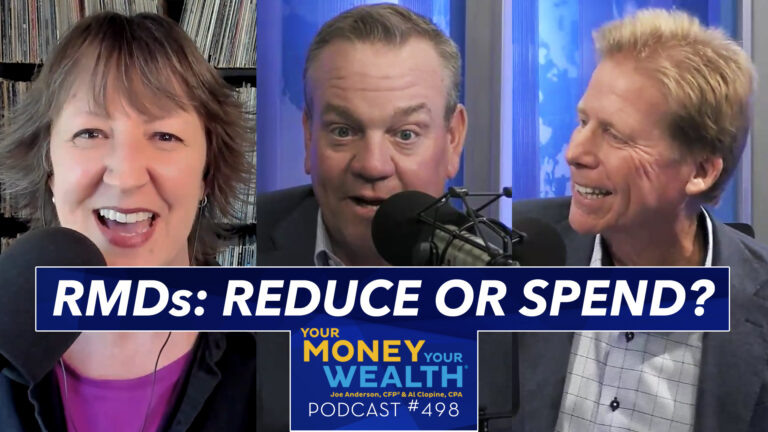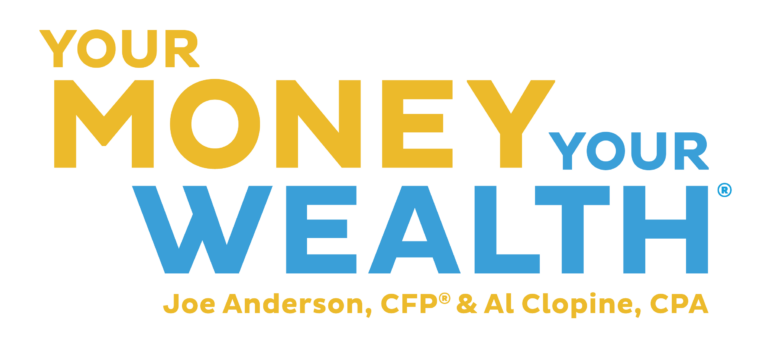With so many retirement planning strategies and the plethora of information on the internet, it can be hard for some to prioritize where to start when it comes to planning for their retirement. Joe Anderson, CFP® and Alan Clopine, CPA share eight proven ways to boost your retirement income. Original publish date January 28, 2017 (hour 2). Note that content may be outdated as rules and regulations have changed.
02:02 “After age 70 ½, you cannot do an IRA contribution but you can do a Roth IRA contribution.”
04:49 “Why do we not want to solely focus on dividend paying stocks? There’s a lot of risk involved.”
07:52 “If you are in a high dividend strategy and you don’t necessarily need the income, you may want to readjust and be more sophisticated in your strategy.”
10:18 “Delay your retirement by a few years…sometimes we run analyses for people if they retire at 65 versus 68 and it’s incredibly different because what happens in a lot of cases is people are in relatively high earning years so they’re putting maximum amounts in their 401(k) and getting maximum matches from their employers.”
12:17 “When you add the Social Security to components, sometimes working just a few more years could add ten years to your portfolio.”
12:35 “See whether a reverse mortgage makes sense for you…we did a webinar on home equity and that was one of the things we talked about.”
17:59 “Can I claim a loss from my Roth IRA? I have a Roth IRA open for over 10 years now. I have contributed about $15K, but I lost around 80% of it due to some stocks that I invested in. Can I claim this 80% lost in my tax return? I know that I can claim up to $3,000/year for capital losses in regular investment, but can I claim my losses in the Roth IRA when I withdraw the money, or sell the stock(s)?” *Question from Investopedia Advisor Insights
18:35 “Once any dollar goes into a Roth IRA or regular IRA, the capital gains rules don’t apply anymore, so you don’t get to claim the gains or losses.”
20:26 “It’s difficult to get money into a Roth IRA because a) there are contribution limitations…b) if you convert money, that’s unlimited but realize that you’re paying tax as you convert those dollars.”
29:35 “Should I retire early to take care of my parents? Within the next six months, I plan to quit working so that I can relocate and take care of my parents. I will be 50 years old at that time. I have no debt, am not married, and have no children. All of my living expenses will be paid for by my parents as compensation for taking care of them. In addition, I have a $700,000 nest egg. Many friends and colleagues are telling me I am ridiculous to retire so early. I don’t agree. What is your opinion?” *Question from Investopedia Advisor Insights
31:44 “Well, how bad of shape are mom and dad? Are they going to live another twenty years or two years? If they’re going to live another twenty years, then sure, go for it.”
32:53 “This may not be forever; you can always go back to work.”
Listen to the YMYW podcast:

Amazon Music
AntennaPod
Anytime Player
Apple Podcasts
Audible
Castbox
Castro
Curiocaster
Fountain
Goodpods
iHeartRadio
iVoox
Luminary
Overcast
Player FM
Pocket Casts
Podbean
Podcast Addict
Podcast Index
Podcast Guru
Podcast Republic
Podchaser
Podfriend
PodHero

Podknife
podStation
Podverse
Podvine
Radio Public
Rephonic
Sonnet
Spotify
Subscribe on Android
Subscribe by Email
RSS feed
IMPORTANT DISCLOSURES:
Pure Financial Advisors is a registered investment advisor. This show does not intend to provide personalized investment advice through this broadcast and does not represent that the securities or services discussed are suitable for any investor. Investors are advised not to rely on any information contained in the broadcast in the process of making a full and informed investment decision.
• Investment Advisory and Financial Planning Services are offered through Pure Financial Advisors, LLC, a Registered Investment Advisor.
• Pure Financial Advisors LLC does not offer tax or legal advice. Consult with your tax advisor or attorney regarding specific situations.
• Opinions expressed are not intended as investment advice or to predict future performance.
• Past performance does not guarantee future results.
• Investing involves risk including the potential loss of principal. No investment strategy can guarantee a profit or protect against loss in periods of declining values.
• All information is believed to be from reliable sources; however, we make no representation as to its completeness or accuracy. As rules and regulations change, content may become outdated.
• Intended for educational purposes only and are not intended as individualized advice or a guarantee that you will achieve a desired result. Before implementing any strategies discussed you should consult your tax and financial advisors.
CFP® – The CERTIFIED FINANCIAL PLANNER™ certification is by the Certified Financial Planner Board of Standards, Inc. To attain the right to use the CFP® designation, an individual must satisfactorily fulfill education, experience and ethics requirements as well as pass a comprehensive exam. Thirty hours of continuing education is required every two years to maintain the designation.
AIF® – Accredited Investment Fiduciary designation is administered by the Center for Fiduciary Studies fi360. To receive the AIF Designation, an individual must meet prerequisite criteria, complete a training program, and pass a comprehensive examination. Six hours of continuing education is required annually to maintain the designation.
CPA – Certified Public Accountant is a license set by the American Institute of Certified Public Accountants and administered by the National Association of State Boards of Accountancy. Eligibility to sit for the Uniform CPA Exam is determined by individual State Boards of Accountancy. Typically, the requirement is a U.S. bachelor’s degree which includes a minimum number of qualifying credit hours in accounting and business administration with an additional one-year study. All CPA candidates must pass the Uniform CPA Examination to qualify for a CPA certificate and license (i.e., permit to practice) to practice public accounting. CPAs are required to take continuing education courses to renew their license, and most states require CPAs to complete an ethics course during every renewal period.










